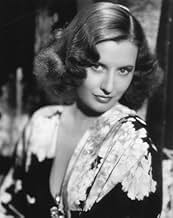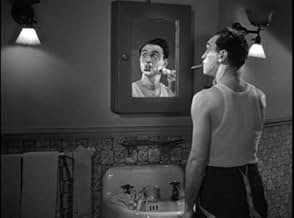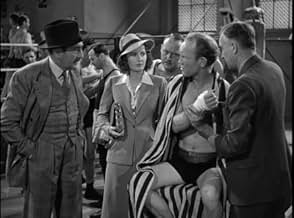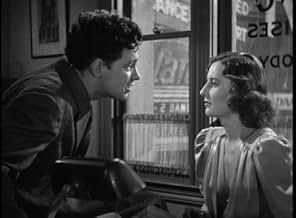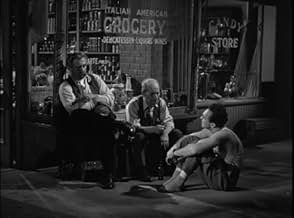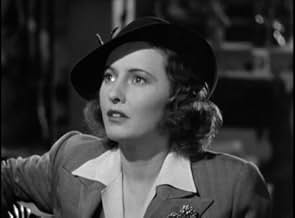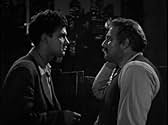IMDb RATING
6.8/10
2.3K
YOUR RATING
A poor young Italian man, who is a virtuoso on the violin, wishes to become a champion boxer to make a fortune for his family. But what is the road to success and happiness, and what is the ... Read allA poor young Italian man, who is a virtuoso on the violin, wishes to become a champion boxer to make a fortune for his family. But what is the road to success and happiness, and what is the price?A poor young Italian man, who is a virtuoso on the violin, wishes to become a champion boxer to make a fortune for his family. But what is the road to success and happiness, and what is the price?
- Nominated for 1 Oscar
- 1 win & 1 nomination total
Edward Brophy
- Roxy Lewis
- (as Edward S. Brophy)
Charles Halton
- Newspaperman
- (scenes deleted)
Stanley Andrews
- Driscoll - Fight Official
- (uncredited)
Gordon Armitage
- Fighter
- (uncredited)
Earl Askam
- Policeman
- (uncredited)
Don Brodie
- Reporter
- (uncredited)
Mushy Callahan
- Fight fan
- (uncredited)
Dora Clement
- Ill Ringsider Who Won't Leave
- (uncredited)
Featured reviews
In this adaptation of the famous Odets play, a young man must choose between music and boxing. In his star-making role, Holden looks impossibly young, and turns in a surprisingly strong performance, given his inexperience. Stanwyck is quite good in a typical role of a tough broad with a soft heart. She helped Holden overcome his jitters and the two developed a legendary friendship during the filming. Cobb, only seven years older than Holden, is schmaltzy but touching as the latter's father. Levene is wonderful as Holden's brother-in-law. Menjou overacts. Mamoulian is at his best when depicting the family life of the Bonapartes. The fight scenes are brief but effective.
The acclaimed play by Clifford Odets, Golden Boy, ran for 250 performances during the 1937-1938 season on Broadway and as Columbia had now pulled itself into the big leagues of studios in Hollywood, Harry Cohn was able to bid for this much heralded property right up there with Mayer, Zanuck, and Zukor.
The problem was that the one guy who could have played it best, John Garfield, was over at another studio. Garfield was in the original cast on Broadway, but in the role of the brother-in-law Siggie that Sam Levene plays here. Eventually however Garfield did play the title role in a revival on Broadway in 1952, it was the last thing he did.
When I lived in New York, I saw a revival of Clifford Odets's Awake and Sing on stage and the left wing nostrums of the day were dated in the Reagan years of the Eighties. Golden Boy is similarly dated. Yet the performances in the film still hold up to some degree.
When Harry Cohn couldn't get Tyrone Power loaned out from 20th Century Fox, he decided to go for an unknown. Director Rouben Mamoulian while testing actresses for the sister part that eventually went to Bernice Blinn, he spotted a young actor who had just done two tiny bit parts in Paramount features feeding lines to the actress whose test it was. Mamoulian persuaded Cohn to call off the search and William Holden's career was launched.
It's legendary now how Barbara Stanwyck worked and rehearsed with Holden endlessly to make sure he scored a success in his feature film debut. Holden paid a heartfelt tribute to her at an Oscar ceremony and when she got her Lifetime Achievement Oscar she dedicated it to him.
It's legendarily unselfish of Stanwyck to do what she did in a town and industry where egos are gargantuan. Unselfish, but also practical. She knew that if he flopped in the lead the film would have gone down the toilet and it wouldn't do her career any good.
The only player from the original cast on Broadway to come to Hollywood was Lee J. Cobb. And not in the part he played on Broadway, on Broadway he was the neighbor Mr. Carp, in the film he's made up to be older as Cobb often was as Bill Holden's father. This set a pattern in his career.
Two other performances of note are Adolphe Menjou as Holden's manager and Joseph Calleia as the gangster Fusselli who buys into Holden's contract.
This story of a Depression kid who had a choice between a career in the ring and a career playing the violin had to be heavily rewritten for the screen. The adulterous relationship between the married Menjou whose wife we never see and Stanwyck was barely mentioned. And Stanwyck's own character was cleaned up quite a bit, in the original play she's more of a tramp than here.
My guess is that Golden Boy would have to be heavily rewritten if it were updated for today. The critical success, but financial failure of Ron Howard's Cinderella Man which was a true story of a heavyweight champion in the Depression found no audience today.
Though it's dated badly, the sincerity of the performances do come through and it's easy to see why William Holden became the star he was.
The problem was that the one guy who could have played it best, John Garfield, was over at another studio. Garfield was in the original cast on Broadway, but in the role of the brother-in-law Siggie that Sam Levene plays here. Eventually however Garfield did play the title role in a revival on Broadway in 1952, it was the last thing he did.
When I lived in New York, I saw a revival of Clifford Odets's Awake and Sing on stage and the left wing nostrums of the day were dated in the Reagan years of the Eighties. Golden Boy is similarly dated. Yet the performances in the film still hold up to some degree.
When Harry Cohn couldn't get Tyrone Power loaned out from 20th Century Fox, he decided to go for an unknown. Director Rouben Mamoulian while testing actresses for the sister part that eventually went to Bernice Blinn, he spotted a young actor who had just done two tiny bit parts in Paramount features feeding lines to the actress whose test it was. Mamoulian persuaded Cohn to call off the search and William Holden's career was launched.
It's legendary now how Barbara Stanwyck worked and rehearsed with Holden endlessly to make sure he scored a success in his feature film debut. Holden paid a heartfelt tribute to her at an Oscar ceremony and when she got her Lifetime Achievement Oscar she dedicated it to him.
It's legendarily unselfish of Stanwyck to do what she did in a town and industry where egos are gargantuan. Unselfish, but also practical. She knew that if he flopped in the lead the film would have gone down the toilet and it wouldn't do her career any good.
The only player from the original cast on Broadway to come to Hollywood was Lee J. Cobb. And not in the part he played on Broadway, on Broadway he was the neighbor Mr. Carp, in the film he's made up to be older as Cobb often was as Bill Holden's father. This set a pattern in his career.
Two other performances of note are Adolphe Menjou as Holden's manager and Joseph Calleia as the gangster Fusselli who buys into Holden's contract.
This story of a Depression kid who had a choice between a career in the ring and a career playing the violin had to be heavily rewritten for the screen. The adulterous relationship between the married Menjou whose wife we never see and Stanwyck was barely mentioned. And Stanwyck's own character was cleaned up quite a bit, in the original play she's more of a tramp than here.
My guess is that Golden Boy would have to be heavily rewritten if it were updated for today. The critical success, but financial failure of Ron Howard's Cinderella Man which was a true story of a heavyweight champion in the Depression found no audience today.
Though it's dated badly, the sincerity of the performances do come through and it's easy to see why William Holden became the star he was.
While 1939 has been properly established as a year of many exceptional films of the American cinema, my favorite actor, Miss Barbara Stanwyck, starred in two: The DeMille epic UNION PACIFIC, and this Clifford Odets' play-turned-movie, GOLDEN BOY. While this film is usually recognized as the one that made William Holden a star, equally famous is the story of how he would have been fired from the film during production had it not been for veteran Stanwyck sticking up for him, insisting that they give him a chance, and then helping him to be a success. There were no shortages of established leading men waiting in the wings for this coveted role, so Barbara's unselfish act forged a life-long relationship between them for which Holden thanked her with a gift of roses each year on the anniversary of the film's opening. In one review, Richard Corliss writes, "...Stanwyck godmothered the young William Holden to stardom and earned his lifelong devotion." I'm sure this real life teacher/student relationship is also mirrored in the actual drama that unfolds on the screen. In spite of their difference in age, however, it's not as vast as the Holden/Swanson relationship in SUNSET BOULEVARD, and the chemistry on Golden Boy is more evenly matched and more appealing. Furthermore, the supporting cast of Aldophe Menjou, as the boxing manager, Lee J. Cobb as Holden's dad, and Sam Levene as Holden's brother-in-law is so tightly woven that the movie has all the charm and intensity of the Broadway play on which it is based. A memorable line that Stanwyck delivers when she is luring the golden violin prodigy from practicing his scales to make some extra dough on the side as a prizefighter is, "...you take a chance the day you are born, so why stop now?" When he doesn't at first take the bait, watch out for the dated line, "I'll see you in 1966 when, by then, you may have become somebody..." Of course, thanks to Barbara, it happened in 1939. This is an extremely satisfying film suitable for the whole family.
Well-written and well-acted vehicle serves as William Holden's entree to stardom. He was just 21 and is easier to recognize in his opening scene by his voice rather than his boyish looks and longish hair. Regardless of what it took to get him to give this performance, it is one that will be long remembered. Barbara Stanwyck plays the tough cookie who discovers she has a heart of gold, reminiscent of her role later perfected in "Meet John Doe." When asked if she was Adolphe Menjou's girl, Barbara replies "I'm my mother's girl." Great cast of supporting character actors add to enjoyment of a solid production whose best scenes involve family and not the ring. Good camera work, especially of those fight scenes, excellent sets, and great direction make this a surprisingly good night's entertainment. I avoided it for years thinking this was just another fight movie -- it is not -- and am now sorry that I waited.
This is a wonderful, compelling, emotionally charged movie, with characters that are both interesting and likable. Of course, the central character of the movie is Joe Bonaparte, played by a young, gifted actor named William Holden. Joe's conflict, between his quest for fame as a prize fighter and his father's wish to become a concert violinist, although seemingly corny and contrived, actually works in this movie. And this can be attributed to the fine acting of all the players - Barbara Stanwyck, Lee J. Cobb, Adolph Menjou, and William Holden - who prove that high quality acting can transform a good script into a great script. One particularly intense scene is when Joe tries to play the violin - and he can't, leaving him devastated in the knowledge that he had squandered a gift and in the process had disappointed his father. This is a movie that is worth the time to watch and to enjoy.
Did you know
- TriviaWilliam Holden was so grateful to Barbara Stanwyck for her insistence on casting him in L'Esclave aux mains d'or (1939), his first big role, that he reportedly sent her flowers every year on the anniversary of the first day of filming.
- GoofsJoe's chest is completely smooth during the big fight. Immediately after the fight, when he is dressed, he has chest hair visible at the top of his shirt.
- Quotes
Eddie Fuseli: This your girl?
Lorna Moon: I'm my mother's girl.
- Alternate versionsA video version in Argentina was lifted from a 16mm print from Columbia Pictures, in English with Spanish language subtitles. The credits of this version are translated in Spanish.
- ConnectionsEdited into Head (1968)
- SoundtracksWe're in the Money Now
Sung a cappella by Adolphe Menjou to the tune of the traditional
nursery rhyme "The Farmer in the Dell"
- How long is Golden Boy?Powered by Alexa
Details
- Release date
- Country of origin
- Language
- Also known as
- Golden Boy
- Filming locations
- Eighth Avenue and 50th Street, Manhattan, New York City, New York, USA(Madison Square Garden, located at the West side of 8th Avenue from 1925 to 1968)
- Production company
- See more company credits at IMDbPro
- Runtime
- 1h 39m(99 min)
- Color
- Aspect ratio
- 1.37 : 1
Contribute to this page
Suggest an edit or add missing content

